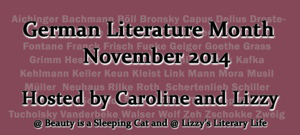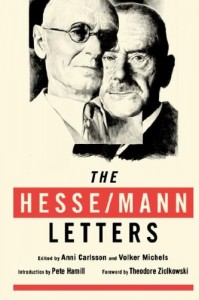This review is part of the German Literature Month, hosted by Lizzie (Lizzies Literary Life) and Caroline (Beauty is a Sleeping Cat)
Thomas Mann received the Nobel Prize for Literature in 1929, Hermann Hesse in 1946. It goes without saying that I was reading the correspondence of these two eminent writers with great curiosity.
It starts in 1910. Hesse has published in his journal Der März a moderately critical review of Mann’s new novel Royal Highness that seemed to him a bit too harsh afterwards. Therefore Hesse is in a way apologizing to Mann in his very first letter. But Thomas Mann is not offended and answers in his typical conciliatory tone that he appreciates Hesse’s “constructive” remarks. He even writes that he considers to submitting something for publication in Der März but mentions also the fact that he is so busy right now.
After this quite hopeful beginning, the communication lingers rather sluggishly between the two for many years, until 1927 or 1928. The reason for this may be partly because they were too immersed in their own writing business but I suppose it had also something to do with principal differences between the two at least during that period.
While Hesse was a pacifist from an early stage of his life who emigrated to neutral Switzerland, distancing himself from Germany also by adopting Swiss citizenship – he was by the way born as a Russian citizen and was technically never a German national – Thomas Mann was during WWI not free from nationalistic feelings, which he expressed most famously in his Reflections of an Unpolitical Man. But while he fell out completely with his brother Heinrich for several years (they later reconciled) for political reasons – Heinrich was for him the principal partisan of superficial French civilisation as opposed to the much deeper German Kultur of which he saw himself as the main representative – the relations with Hesse remained cordial even during this time.
The lost war and the fierce struggle of the young Weimar Republic for survival from the very beginning against radical elements from the left and even more violently from the right caused Thomas Mann to reassess his previous position. He turned into one of the most outspoken defenders of the new democracy against the radical elements in Germany and in the 1920s he became a kind of unofficial intellectual president of the Republic. In this period he not only became close again with brother Heinrich, also the correspondence with Hesse becomes more regular and much more interesting.
They discuss literature – Hesse’s Steppenwolf has just appeared and praised highly by Thomas Mann -, they discuss Literaturpolitik, especially the role of the Prussian Academy. Mann wants to turn this body into a bulwark against the radicals and seeks for Hesse’s support. But Hesse has already disengaged himself completely from Germany. It’s not that he doesn’t care for it. But he simply doesn’t see the point to get involved in the meetings and proceedings of an organization with which he feels no longer any bond.
The probably most interesting part of the correspondence covers the time from 1933 to 1945. While Mann travels abroad to avoid probable arrest, he still has hope that his works will be available to readers in Germany even after the Nazis took power there. Only after the University of Bonn strips him of his doctoral degree honoris causa and after an intervention of his daughter Erika, he breaks “officially” with Germany and makes it clear that he is siding with the emigrants.
It is revealing that some newspapers in Switzerland, where Hesse is residing, attack Mann and the other exiled German writers in a rather rude and disgusting way. The attack was orchestrated by Eduard Korrodi, a mediocre literary critic with whom also Hesse had a previous falling-out.
Family news (especially touching Mann’s reaction on the suicide of his son Klaus), health issues, exchange of evaluations of the actual political situation, difficulties with publishers or the life of an émigré who has to settle in a surrounding that is completely new to him, support to other émigrés who cannot support themselves or need an affidavit for immigration – there are hardly any issues which the two are not discussing in this interesting correspondence. We as readers see also how the mature masterpieces of the two writers, Hesse’s Glass Bead Game and Mann’s Lotte in Weimar, Doctor Faustus and Felix Krull take shape. Mann, although two years older than Hesse and despite the fact that for several years he was “on the road”, seems to be the more vital one. Hesse’s productivity as a writer was seriously reduced by bad health and he mentions frequently how worn out he feels.
This correspondence contains nothing sensational but it gives interesting insights in the lives and workshops of two of the greatest German-language writers of the 20th century. For me it was touching to see how both men, so different they were in many respects, started to develop a friendship. There is not one occasion when you have the feeling that there is a tension between them or a strong disagreement. I don’t want to psychologize but I guess that the two who read each other’s work carefully understood that also the other one had his own share of demons deep inside and that might be one reason why they felt connected. There is also a deep sense of civility in both writers which they both appreciate very much, especially in a time of barbarity. They both saw themselves also as representatives of the “true” Germany – the one that holds culture and humanism high. When Thomas Mann said that
“Where I am, there is Germany. I carry my German culture in me. I have contact with the world and I do not consider myself fallen,”
we can be sure that Hermann Hesse completely agreed with that notion.
It made me also feel a bit nostalgic to read this correspondence. Hesse – who added frequently a small watercolor painting as a header – and Mann were blessed letter writers. Most of the longer letters seem to be carefully composed although the communication flows so freely. The form of address is changing over the years from the very formal Sehr geehrter Herr to Lieber Freund (dear friend) – especially for the son of a Senator from Lübeck this was an extraordinary sign of connectedness; Mann was usually very polite and friendly, but also distanced in most of his correspondence with other partners.
I am wondering if there will be any comparable correspondence of writers in the time of email and other forms of instant messaging – or is this something we have lost for good?
Hermann Hesse / Thomas Mann: The Hesse/Mann Letters, transl. by Ralph Manheim, Jorge Pinto Books, New York 2005
© Thomas Hübner and mytwostotinki.com, 2014. Unauthorized use and/or duplication of this material without expressed and written permission from this blog’s author and/or owner is strictly prohibited. Excerpts and links may be used, provided that full and clear credit is given to Thomas Hübner and mytwostotinki.com with appropriate and specific direction to the original content.





 Facebook
Facebook RSS
RSS Twitter
Twitter